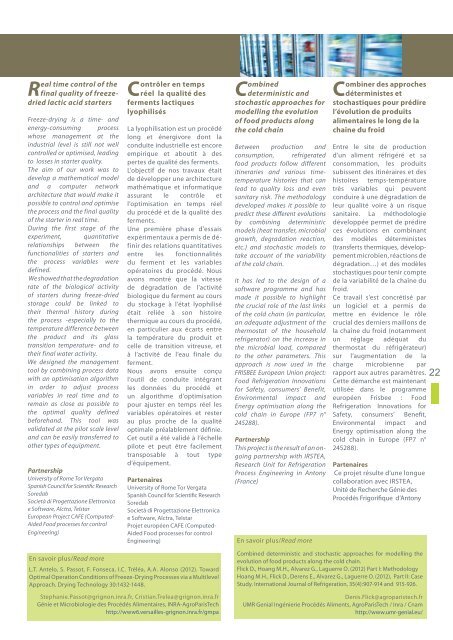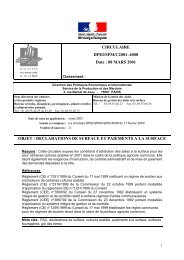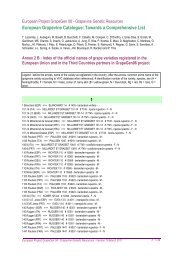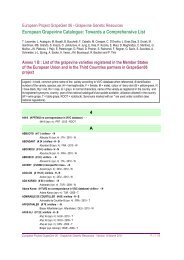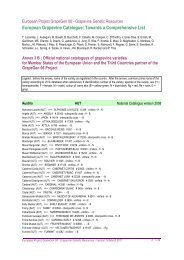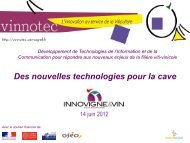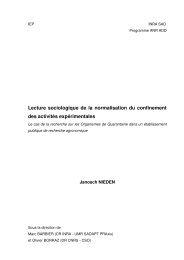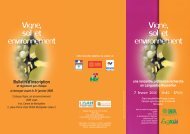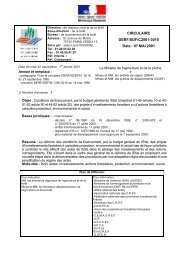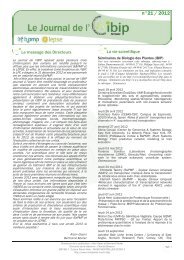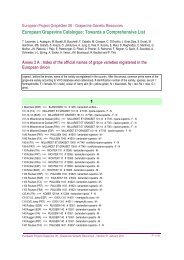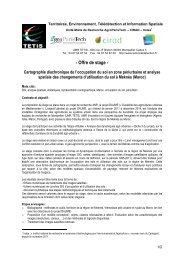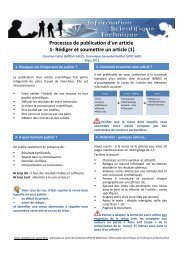2013 - Le fouloir dynamique - INRA Montpellier
2013 - Le fouloir dynamique - INRA Montpellier
2013 - Le fouloir dynamique - INRA Montpellier
- No tags were found...
You also want an ePaper? Increase the reach of your titles
YUMPU automatically turns print PDFs into web optimized ePapers that Google loves.
Real time control of thefinal quality of freezedriedlactic acid startersFreeze-drying is a time- andenergy-consuming processwhose management at theindustrial level is still not wellcontrolled or optimised, leadingto losses in starter quality.The aim of our work was todevelop a mathematical modeland a computer networkarchitecture that would make itpossible to control and optimisethe process and the final qualityof the starter in real time.During the first stage of theexperiment, quantitativerelationships between thefunctionalities of starters andthe process variables weredefined.We showed that the degradationrate of the biological activityof starters during freeze-driedstorage could be linked totheir thermal history duringthe process -especially to thetemperature difference betweenthe product and its glasstransition temperature- and totheir final water activity.We designed the managementtool by combining process datawith an optimisation algorithmin order to adjust processvariables in real time and toremain as close as possible tothe optimal quality definedbeforehand. This tool wasvalidated at the pilot scale leveland can be easily transferred toother types of equipment.PartnershipUniversity of Rome Tor VergataSpanish Council for Scientific ResearchSoredabSocietà di Progettazione Elettronicae Software, Alctra, TelstarEuropean Project CAFE (Computed-Aided Food processes for controlEngineering)Contrôler en tempsréel la qualité desferments lactiqueslyophilisésLa lyophilisation est un procédélong et énergivore dont laconduite industrielle est encoreempirique et aboutit à despertes de qualité des ferments.L’objectif de nos travaux étaitde développer une architecturemathématique et informatiqueassurant le contrôle etl’optimisation en temps réeldu procédé et de la qualité desferments.Une première phase d’essaisexpérimentaux a permis de définirdes relations quantitativesentre les fonctionnalitésdu ferment et les variablesopératoires du procédé. Nousavons montré que la vitessede dégradation de l’activitébiologique du ferment au coursdu stockage à l’état lyophiliséétait reliée à son histoirethermique au cours du procédé,en particulier aux écarts entrela température du produit etcelle de transition vitreuse, età l’activité de l’eau finale duferment.Nous avons ensuite conçul’outil de conduite intégrantles données du procédé etun algorithme d’optimisationpour ajuster en temps réel lesvariables opératoires et resterau plus proche de la qualitéoptimale préalablement définie.Cet outil a été validé à l’échellepilote et peut être facilementtransposable à tout typed’équipement.PartenairesUniversity of Rome Tor VergataSpanish Council for Scientific ResearchSoredabSocietà di Progettazione Elettronicae Software, Alctra, TelstarProjet européen CAFE (Computed-Aided Food processes for controlEngineering)Combineddeterministic andstochastic approaches formodelling the evolutionof food products alongthe cold chainBetween production andconsumption, refrigeratedfood products follow differentitineraries and various timetemperaturehistories that canlead to quality loss and evensanitary risk. The methodologydeveloped makes it possible topredict these different evolutionsby combining deterministicmodels (heat transfer, microbialgrowth, degradation reaction,etc.) and stochastic models totake account of the variabilityof the cold chain.It has led to the design of asoftware programme and hasmade it possible to highlightthe crucial role of the last linksof the cold chain (in particular,an adequate adjustment of thethermostat of the householdrefrigerator) on the increase inthe microbial load, comparedto the other parameters. Thisapproach is now used in theFRISBEE European Union project:Food Refrigeration Innovationsfor Safety, consumers’ Benefit,Environmental impact andEnergy optimisation along thecold chain in Europe (FP7 n°245288).PartnershipThis project is the result of an ongoingpartnership with IRSTEA,Research Unit for RefrigerationProcess Engineering in Antony(France)En savoir plus/Read moreCombiner des approchesdéterministes etstochastiques pour prédirel’évolution de produitsalimentaires le long de lachaine du froidEntre le site de productiond’un aliment réfrigéré et saconsommation, les produitssubissent des itinéraires et deshistoires temps-températuretrès variables qui peuventconduire à une dégradation deleur qualité voire à un risquesanitaire. La méthodologiedéveloppée permet de prédireces évolutions en combinantdes modèles déterministes(transferts thermiques, développementmicrobien, réactions dedégradation…) et des modèlesstochastiques pour tenir comptede la variabilité de la chaîne dufroid.Ce travail s’est concrétisé parun logiciel et a permis demettre en évidence le rôlecrucial des derniers maillons dela chaîne du froid (notammentun réglage adéquat duthermostat du réfrigérateur)sur l’augmentation de lacharge microbienne parrapport aux autres paramètres.Cette démarche est maintenantutilisée dans le programmeeuropéen Frisbee : FoodRefrigeration Innovations forSafety, consumers’ Benefit,Environmental impact andEnergy optimisation along thecold chain in Europe (FP7 n°245288).PartenairesCe projet résulte d’une longuecollaboration avec IRSTEA,Unité de Recherche Génie desProcédés Frigorifique d’Antony22En savoir plus/Read moreL.T. Antelo, S. Passot, F. Fonseca, I.C. Tréléa, A.A. Alonso (2012). TowardOptimal Operation Conditions of Freeze-Drying Processes via a MultilevelApproach. Drying Technology 30:1432-1448.Stephanie.Passot@grignon.inra.fr, Cristian.Trelea@grignon.inra.frGénie et Microbiologie des Procédés Alimentaires, <strong>INRA</strong>-AgroParisTechhttp://www6.versailles-grignon.inra.fr/gmpaCombined deterministic and stochastic approaches for modelling theevolution of food products along the cold chain.Flick D., Hoang M.H., Alvarez G., Laguerre O. (2012) Part I: MethodologyHoang M.H., Flick D., Derens E., Alvarez G., Laguerre O. (2012), Part II: CaseStudy. International Journal of Refrigeration, 35(4):907-914 and 915-926.Denis.Flick@agroparistech.frUMR Genial Ingénierie Procédés Aliments, AgroParisTech / Inra / Cnamhttp://www.umr-genial.eu/


